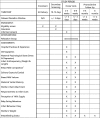Mother And late Preterm Lactation Study (MAPLeS): a randomised controlled trial testing the use of a breastfeeding meditation by mothers of late preterm infants on maternal psychological state, breast milk composition and volume, and infant behaviour and growth
- PMID: 32264947
- PMCID: PMC7137320
- DOI: 10.1186/s13063-020-4225-3
Mother And late Preterm Lactation Study (MAPLeS): a randomised controlled trial testing the use of a breastfeeding meditation by mothers of late preterm infants on maternal psychological state, breast milk composition and volume, and infant behaviour and growth
Abstract
Background: Late preterm infants suffer from more complications and are less likely to be breastfed compared to term infants and their mothers experience higher levels of stress than mothers with term infants. The physiological or hormonal responses that influence milk ejection, milk production, and/or maternal behaviour are possible mechanisms by which maternal distress could negatively influence breastfeeding success. Maternal mood might also affect infant behaviour (feeding, sleeping, and crying) through changes in milk volume and composition, and consequently breastfeeding success and infant growth. Previous research, using relaxation therapy in 64 Malaysian first-time mothers breastfeeding their full-term infants, demonstrated that the therapy was effective in reducing maternal stress and improving infant growth. We hypothesise that expected benefits are even greater in a more vulnerable population where additional breastfeeding support is especially needed, such as in mothers of late preterm infants.
Methods/design: This protocol describes our randomised controlled trial that tests whether a breastfeeding meditation audio reduces maternal stress in mothers of late preterm infants in London. Home visits will be conducted at 2-3 and 6-8 weeks post-delivery. Participants will be randomised to a control group or an intervention group, where mothers will be asked to listen to a meditation tape on a daily basis while breastfeeding. The main outcomes of the intervention will be maternal stress markers and infant weight Z-score. Potential mediators will be the secondary outcomes and include breast milk macronutrient and hormone levels (ghrelin, leptin, cortisol, and adiponectin), milk volume assessed by 48-h test-weighing, and maternal engagement with the infant. Infant behaviour, including crying and sleeping, and infant appetite will be evaluated. Data about other mediators such as maternal perception of milk supply and salivary oxytocin will be collected.
Discussion: We hypothesise that the use of the breastfeeding meditation will reduce maternal stress and consequently improve infant growth mediated by changes in milk composition and volume and maternal behaviour. This study will allow us to understand the mother-infant factors that influence breastfeeding in late preterm infants and potentially identify a method that could improve mother, infant, and breastfeeding outcomes.
Trial registration: ClinicalTrials.gov, NCT03791749. Registered 1 January 2019.
Keywords: Breast milk; Breastfeeding; Infant behaviour; Infant growth; Late preterm infants; Maternal stress; Meditation; Oxytocin; Preterm infants; Relaxation therapy.
Conflict of interest statement
The authors declare that they have no competing interests.
Figures


References
-
- Wells J. The role of cultural factors in human breastfeeding: adaptive behaviour or biopower. J Hum Ecol. 2006;14:39–47.

